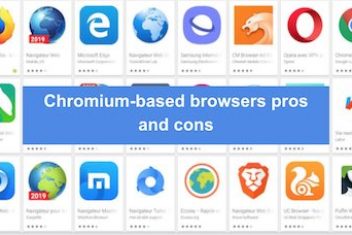The Internet was designed to be free from any kind of surveillance. Yet, online trackers are ruthless in finding out more about ourselves and our online habits. They are also sneaky, making it hard to spot whenever a tracking attempt is made. While mostordinary Internet users have no idea about being constantly watched, those taking care of their online privacy are faced with a never-changing question: Who is tracking me right now?
Why Does Someone Want to Collect Your Data?
With 2.5 quintillion bytes of data generated every day we’re just at the beginning of the era, where information is the most valuable asset. Aside from conspiracies about evil governments with their mass surveillance, your data might be of legal interest to any private company. Knowing more about your habits, tastes, and personality, organizations can target their ad campaigns, be present wherever you go online, and also improve your overall user experience.
Read: How to stop data collection by Microsoft on Windows 10
Data tells a lot about the products we might want or choices we are likely to make. How a user behaves online, where they come from, what can be a potential problem they are facing — all of that can be simply scraped from one’s digital fingerprint. Data collectors create more and more perfect models of our digital clones, which helps them to simulate different scenarios of a person’s interaction with a brand.

Image by TheDigitalWay from Pixabay
Almost all sites out there are trying to grasp a bit of their visitors’ data. At the same time, the global big players, like Google or Facebook, set this process at the core of their business model. They turn into a profit everything that their visitors ever share with a favorite “free service”. Both Google and Facebook are notorious for paying massive fines for privacy breaches and poor data collection practices. But other less-known online trackers violate your privacy and make your digital confidentiality at risk too. You might want to detect the websites that track you before it becomes too late to claim your data back.
Read: How to find out who is using your wifi
How to Detect Tracking ?
Figuring out who is tracking you on the Internet used to be a task for some advanced users but it is no longer so complicated. Luckily, the community of data privacy and Internet anonymity enthusiasts in the past few years came up with a few great anti-tracking tools that anyone can use:
Am I Unique? Analyzer

Am I Unique? is a great tool that helps to learn about the trackers around you. This software analyses the way you are identified online based on the browser broadcast fingerprints that it takes and saves on its secure servers, as well as a 4-month cookie file it installs in your system. Am I Unique? will then be able to compare the fingerprints taken at different dates, allowing you to have an overview of how unique or identifiable your browser is for the online trackers.
Am I Unique? has developed two extensions for the most popular browsers, Chrome and Firefox, so you can keep track of your browser’s uniqueness as well as potential tracking in real-time. Alternatively, just visit their website and go through a quick check that provides you with a personalized result even without logging in.
Read: Top Chrome extensions to improve productivity
Disconnect
Disconnect is an excellent tracker blocking extension. Millions of users around the world trust their data to Disconnect so they can better protect it. Featuring the versions for Chrome, Firefox, Opera, and Safari, this browser extension stops thousands of online trackers and helps to load webpages much quicker. At the same time, Disconnect lets you whitelist any particular website, so you can support the content creators and ensure the full functionality of the web pages.
Once the Disconnect extension for your respective web browser is up and running, you will see the numbers growing next to its logo. This is an indication of how many tracking attempts were registered and blocked on each site. Moreover, Disconnect can visualize the tracking map, showing all the connections between a site and trackers it shares the data with. With the help of these neat infographics, you can manually turn the trackers on and off, depending on your tasks.

Thunderbeam— Lightbeam for Chrome
The idea to visualize tracker connections as a complex network was also implemented in the tool called Lightbeam. Originally developed for Firefox, this extension stopped support for this browser and fully migrated to Chrome, now under a new name — Thunderbeam. More of a visualization tool than a blocker, Lightbeam shows exactly which tracking requests accompany your website visits so you get a better understanding of the data transmission policies of the websites you’re visiting.

Once installed in your Chrome, click the Thunderbeam logo in your Extensions panel. At first, the field will be empty, but it will get rapidly populated with found trackers and a spider net-like system of connections. Sometimes, just seeing the result of a Thunderbeam scan is enough to change your mind about a website or to stop using it altogether.
Trace My Shadow

Trace My Shadow isn’t here to block the trackers, but rather, to make you see clearly where the tracking comes from. This service combines all the best practices for safe and anonymous use of the Internet with an analysis of all potential ways how tracking is done. With Trace My Shadow you can see how communication services, software, and hardware can be impacted by unauthorized data collection, as well as learn how to better protect your own devices from it.
Although Trace My Shadow is not being actively managed since 2019, the information that the website contains is still very much up to date. Of course, the newest trends and technologies of the last couple of years might not be included. But the concept of tracking remains the same, so up till now Trace My Shadow completely fulfills its role as an online privacy advisory. You might as well check out the list of alternative open-source software that Trace My Shadow recommends, as just switching to that one helps to drastically reduce your digital trace.
Can Ad Blocking Services Prevent Tracking You on the Web?
An ad blocker is a very first tool that comes to mind whenever we want to improve the quality of web browsing. The Internet feels a lot safer and friendlier when banners and pop-ups disappear from the web pages, while the risk of malware infection goes significantly lower. At the same time, we need to make it clear that ad blockers are not designed specifically to deal with online trackers. Online ads and trackers, even though often tightly connected, are working on different levels of the Web.
Having said this, it is important to mention that the majority of Internet security tools are quite multifunctional. Some of the best ad blockers in class include high-performance tracking prevention mechanisms that work simultaneously with ad-blocking filters. So does, for example, AdLock is an ad blocker that provides you with the tracking overview in real-time and automates all-around protection from all sorts of dangerous, or simply annoying online ads, and even block unwanted tabs from opening because of ads. Yet, remember that only a combination of several quality tools can secure relatively high protection from trackers and keep your devices at the top of their security levels.
If you like the content, we would appreciate your support by buying us a coffee. Thank you so much for your visit and support.



